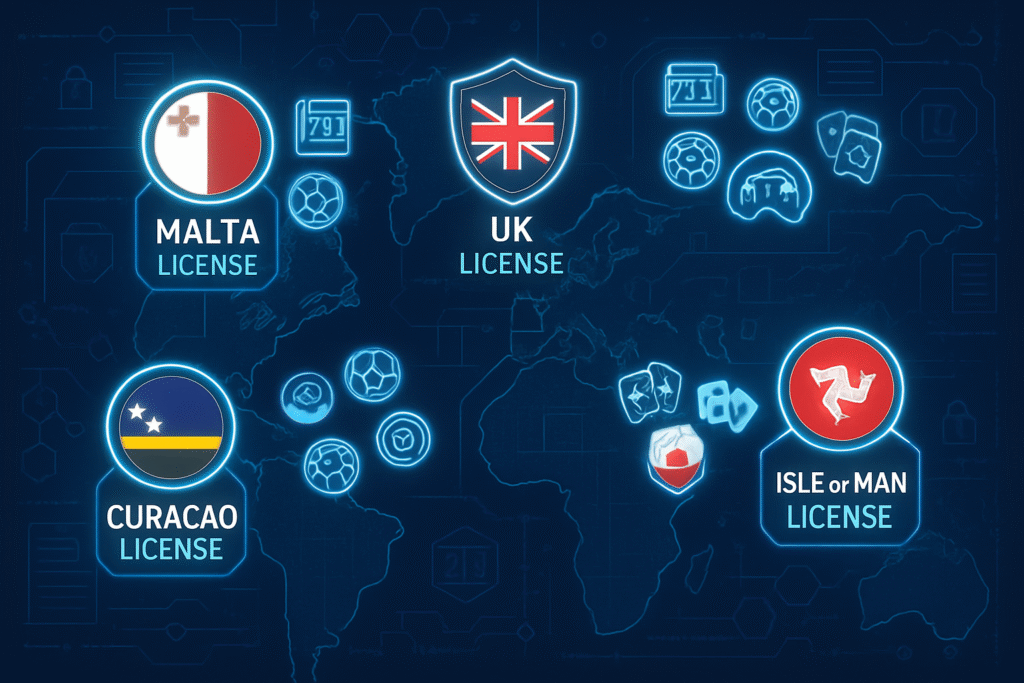As the global iGaming sector becomes increasingly regulated and fiercely competitive, acquiring the right gaming license is not just a formality but a necessity vital to lawful operation, market entry, and long-term viability. An iGaming license grants legal permission to online gambling platforms to participate in wagering, gaming, and related activities involving luck or skill. However, the different types of licenses available to online gaming operators vary significantly.
Licensing structures are influenced by the regulatory philosophies of various jurisdictions, each offering unique definitions, scopes, and eligibility criteria. Consequently, operators need to perform a jurisdictional assessment before starting their operations, choosing a licensing framework that corresponds with their product offerings, target markets, technological capabilities, and risk tolerance. This article examines the various categories of iGaming licenses available globally, categorizing them by regulatory function, coverage of verticals, and operational models.
1. B2C (Business-to-Consumer) License
A B2C license is a license that enables the approved licensee (a company) to provide the gambling services directly to individual players. It is required for front-end operators that offer remote betting or gaming through the use of a website or mobile application. The B2C license has significant compliance requirements, including Anti-Money Laundering (AML), Know Your Customer (KYC), responsible gaming, customer fund segregation, technical audit trail, game fairness, etc.
B2C licenses are available from regulators including:
- The Malta Gaming Authority (MGA) under the Gaming Authorisations Regulations
- The United Kingdom Gambling Commission (UKGC) under the Gambling Act 2005
- The Gibraltar Regulatory Authority
- The Isle of Man Gambling Supervision Commission
- Curaçao through Master License holders
Most B2C operators have additional substantive operational obligations due to stringent due diligence requirements, including periodic operational reviews, oversight through constant monitoring, and enforcement measures for breaches of player protection regulations.
2. B2B (Business-to-Business) License
The B2B license allows for the distribution of gambling software, platforms, payment technology, and aggregation to licensed B2C operators. B2B entities can include game developers, platforms, data analytics, and payment gateway providers. A B2B license provides the client assurance that the service provider is compliant regarding data integrity, RNG certification, game volatility, and system security.
Examples of B2B licensing authorities:
- Malta Gaming Authority (MGA) – Critical Gaming Supply License
- UKGC – Gambling Software License
- Alderney Gambling Control Commission,
- Isle of Man GSC – Network Services License.
B2B providers must also submit regular filings of system audit reports and third-party certifications related to security and quality.
3. Casino License
This license regulates the operation of internet-based games of chance, most often requiring the use of Random Number Generation (RNG), including the following (and others):
- Online slots
- Virtual roulette
- Blackjack
- Baccarat
- Table games with known or predetermined outcomes
In many jurisdictions, casino licenses are simply a subclass of the general regulatory B2C license category, like a Type 1 iGaming license from Malta or a Remote Casino Operating License from the UKGC. Regulators often require extensive game testing, RTP (Return to Player) transparency, and responsible gaming tools.
4. Sports Betting License
A sports betting license allows the operator to offer fixed-odds or pari-mutuel wagering on actual sporting events. Some regulators categorize the license by format:
- Pre-match betting
- Live/in-play betting
- Exchange betting
Sports betting can be licensed with the help of a standalone license or incorporated into a multi-vertical license, depending on jurisdiction. Risk management systems, controls on bet limits, and real-time odds generation can be tested by the regulator.
5. Poker License
As poker is uniquely peer-to-peer in nature, licensing systems often impose additional obligations on operators. These consist of:
- Algorithmic fairness for card-dealings
- Clarity regarding rake calculations
- Disclosure on the liquidity of the network
- Networks for player collusion or detecting bots
Malta and the Isle of Man have dedicated licenses for poker operations based on the added complications to operators’ compliance. For example, Malta’s Type 3 license has a category for games that generate revenue through commissions or fees for participation.
6. Licensing for Lotteries and Number Draws
Operators looking to run digital scratchcards, number games or draw-based lotteries must apply for a lottery license. Although in many countries’ lotteries run on a state basis, certain jurisdictions, including Curaçao, the Isle of Man, and new LATAM markets, allow a private operator to run a lottery by acquiring a lottery license. Lottery licenses strictly define what the licensee can do. There are transparency obligations for the outcomes, mechanisms to ensure the fair distribution of prizes, and ticket sales are usually not permitted in jurisdictions where it is illegal to sell them to consumers.
7. White Label Licenses
White label solutions offer an easy pathway to market and leverage a licensed operator’s brand. The licensed operator carries the legal responsibilities to comply, while the white label partner focuses on marketing, user acquisition, and front-end activities.
White label structures are attractive for operators and jurisdictions such as:
- The United Kingdom, through the UKGC’s License Management Agreement
- Curaçao through Master License sub-licensing
Although appealing to startups, white labels carry significant risks: the partner does not possess legal ownership of the license, is unable to negotiate direct agreements with suppliers, and is wholly reliant on the licensor’s adherence to performance standards.
8. Skill-Based Gaming Licenses
In some jurisdictions, skill-based games are either completely exempted from standard gambling regulation or licensed under a different regime. Examples include:
- Fantasy sports
- Esports betting (in a limited context)
- Rummy, chess, or backgammon
Malta has implemented a Skill Games Regulatory Framework, which requires operators to be licensed for skill games that involve monetization elements. In India, the legality of such games is ultimately determined at the state level. States like Nagaland and Sikkim provide online skill game licenses.
9. Crypto-Enabled iGaming Licenses
As virtual assets and blockchain-based gaming products have been developing, jurisdictions like Curaçao, the Isle of Man, and Malta (through sandbox frameworks) have begun to designate crypto-compliance as an element of their licensing requirements. In particular, operators engaging with cryptocurrencies must implement and monitor additional AML/CTF methods, including wallet verification, transaction tracking, and auditing smart contracts.
While not always a standalone license, acceptance of cryptocurrencies by operators carries obligations of regulatory notification, risk assessment, and – in some cases – supplemental licensing compliance obligations under VASP laws.
The international landscape for iGaming licensing is dispersed but can be functionally divided into two main models: consumer-facing and supplier-facing, each with specific jurisdictional details. Whether you are aiming for a complete B2C license, a technology provider certification, or entering via a white label option, the licensing route you take will impact various operational aspects: access to banking, payment processing, user confidence, and valuation upon exit.
In an industry where the risk to reputation is as crucial as the risk to finances, selecting the appropriate iGaming license—and ensuring ongoing compliance—is essential. It is a requirement for running sustainable, scalable, and legally sound online gambling operations.




